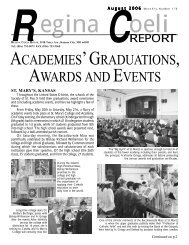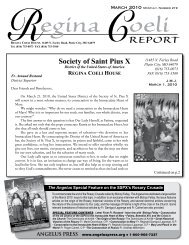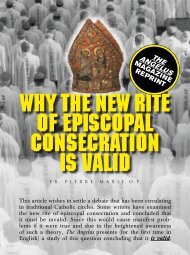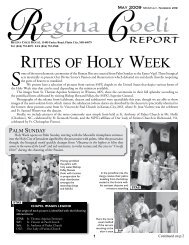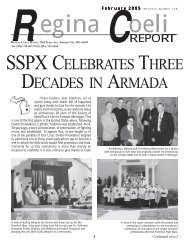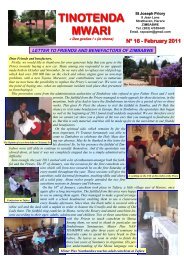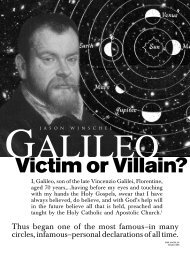Is Feeneyism Catholic? - Society of St. Pius X
Is Feeneyism Catholic? - Society of St. Pius X
Is Feeneyism Catholic? - Society of St. Pius X
You also want an ePaper? Increase the reach of your titles
YUMPU automatically turns print PDFs into web optimized ePapers that Google loves.
38 IS F EENEYISM C ATHOLIC?<br />
died in infancy.” They have the Beatific Vision, and they see the<br />
great Queen, but not move in as part <strong>of</strong> the Mystical Body <strong>of</strong><br />
Christ…I say: If a child dies after having received baptism, he<br />
dies as the son <strong>of</strong> God, but not yet as the child <strong>of</strong> Mary… 50<br />
The emphasized words are at least <strong>of</strong>fensive to the pious ear.<br />
Do they mean that one could go to heaven without being “part <strong>of</strong><br />
the Mystical Body <strong>of</strong> Christ”? The Church rather taught that by<br />
baptism one was incorporated into the Mystical Body <strong>of</strong> Christ,<br />
and thus became not only a son <strong>of</strong> God, but also a child <strong>of</strong> Mary.<br />
Our Lady gave birth not only to the Head (Christ) but also to the<br />
members <strong>of</strong> His Mystical Body: there is not a single member <strong>of</strong><br />
His Body whose Mother she is not.<br />
Fr. Feeney should have applied to baptism the explanation<br />
beautifully exposed by <strong>St</strong>. Thomas. The reader will notice that <strong>St</strong>.<br />
Thomas refers to baptism <strong>of</strong> desire. In this passage, <strong>St</strong>. Thomas<br />
makes clear that the reality contained in the sacrament (res sacramenti)<br />
is absolutely necessary, in both cases <strong>of</strong> baptism and Eucharist;<br />
yet before the reception <strong>of</strong> the exterior sign (sacramentum<br />
tantum), the reality <strong>of</strong> the sacrament can be had by the desire <strong>of</strong> it.<br />
Whether the Eucharist is necessary for salvation?<br />
(Summa Theologica, III, Q.73, A.3)<br />
In this sacrament, two things have to be considered, namely,<br />
the sacrament itself and the reality contained in it. 51 Now it was<br />
stated above that the reality <strong>of</strong> the sacrament is the unity <strong>of</strong> the<br />
Mystical Body, without which there can be no salvation; for<br />
there is no entering into salvation outside the Church, just as in<br />
the time <strong>of</strong> the deluge there was none outside the Ark, which<br />
signified the Church, according to I Pet. 3:20, 21. And it has<br />
been said above (ST, Q.68, A.2, see p.73), that before receiving<br />
a sacrament, the reality <strong>of</strong> the sacrament can be had through the<br />
very desire 52 <strong>of</strong> receiving the sacrament. Accordingly, before the<br />
50 Rev. Fr. Leonard Feeney, M.I.C.M., Bread <strong>of</strong> Life, (<strong>St</strong>ill River, MA: Saint<br />
Benedict Center, 1974) pp.97, 98.<br />
51 Res sacramenti=the grace signified and produced by the sacrament.<br />
52 Ex ipso voto, the very term used by the Council <strong>of</strong> Trent, thereby giving to<br />
<strong>St</strong>. Thomas Aquinas the approbation <strong>of</strong> an infallible Council. Some<br />
followers <strong>of</strong> Fr. Feeney claim that the Council <strong>of</strong> Trent did not uphold this<br />
teaching <strong>of</strong> <strong>St</strong>. Thomas on baptism <strong>of</strong> desire: Bro. Francis, “Reply to<br />
Verbum,” Res Fidei, February 1987, p.9. We see here how false this claim is.



